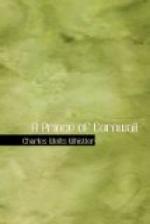Then it seemed to me that it was strange that he knew what I was, and before I cut the bonds I took the cloth from his face, and lo! the man was Evan the outlaw, my enemy!
That told me why he feared me in good truth, for he had need to do so, and I stood back and looked at him with the bright weapon still in my hand, and he cried and begged for mercy unceasingly. It seemed but right that he should be bound helplessly as he had bound me, yet he had not the bitterness of seeing a friend look on him without knowing him as had I. It was a foe whom he saw, and that a righteous one.
Then I was minded to turn away and leave him where he was, until the foe from the forest looked on him for the last time, for it was all that he deserved, and I set my seax back in my belt and turned away to my horse with a great loathing of the man in my mind; and seeing that, he begged for mercy again most pitiably.
That is a hard thing to hear unmoved, and I stayed and looked at him again. My first wrath was leaving me as I saw the fullness of the end of his plans, and I do not think that it is in me to be utterly revengeful.
“What mercy can you hope from me!” I said coldly.
“None, Thane—none. But let me go hence with you. Better the rope than these wild beasts. Or slay me now, and swiftly.”
“Who, of all your friends, tied you here?” I asked him.
“Howel’s men,” he answered. “They took my goods at the ford of Caerau yonder, and so brought me here and left me. That was early this morning.”
“I marvel that you bided in reach of any who might speak with me,” I said.
“My comrades left me, for fear of that same. I must hire ponies to get the goods away. I thought you had died on the wild sea that night.”
“It seems to me that this is but justice on you. The goods you have lost were stolen from honest men. And it were just if I left you bound as you bound me.”
Then the man said slowly: “Ay, it is justice. But will you treat me even as I treated you, Thane?”
I looked at him in some wonder. The man’s face had grown calm, though it was yet grey and drawn, and this seemed as if he would own his fault without excuse. I minded that Nona the princess and her father, ay, and Thorgils, had said that they thought well of Evan the merchant up till this time.
“Supposing I let you go—What then?” I said.
“First of all, I would tell you somewhat for which you will thank me, Thane.”
“Tell me that first,” I said, not altogether believing that he had anything which could be worth my hearing, but with a full mind now to let him go.
Plainly, he had some sort of faith in me, or in the worth of what he had to say, for he began eagerly:
“Thane, when we took you, it was Owen of Cornwall for whom we waited. We were not minding you at all until we saw that we might hurt him through you.”




